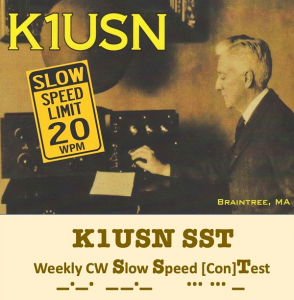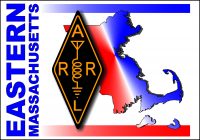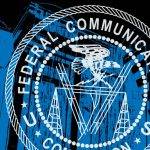 “Pi” Pugh, K1RV, writes:
“Pi” Pugh, K1RV, writes:
Announcing the New Slow Way to Go!
K1USN’s New Weekly Slow Speed Test
Inaugural session Monday, Sept 14, 2020 @ 0000 UTC, (Sunday, Sept 13 @ 8:00 PM EDT)
The CWops Club (CWops) promotes the art of CW for those who wish to expand and improve their on-the-air experiences. CWops’ CW Academy (CWA) program has produced thousands of successful graduates who have gone on to become everyday CW operators. Hundreds of CWA grads have become CWops members after demonstrating their ability to understand and communicate in CW at speeds of 25 WPM and higher!
CWops’ three weekly 25 to 40+ WPM CWT sprints are exciting, stimulating and a great way to improve CW copying ability, operating skills, and propagation knowledge. The CWTs create bonds of friendship among CW-loving operators around the world.
Now, for those just getting started in CW contesting and others who prefer a more leisurely pace, several members of both the K1USN Radio Club and CWops are starting a weekly one-hour slow speed CW contest, the SST. Please join us!
K1USN’s new Slow Speed Test is designed to encourage and assist those who signed up for CWA to learn CW or to improve their CW skills but are not yet copying 25 WPM, as well as all others who feel like “taking it slow and easy” once per week both for their own pleasure and to help others out.
CWops currently offers a total of nine “slow speed” CWT’s per year just after the three CWA graduations where all are asked to slow down to 20 WPM. Many CWA grads make contacts in those sessions, enjoying a well-earned rush of accomplishment. The SST will expand those opportunities for success to 52 weeks per year!
All of us old enough to remember our Novice days recall the rush of adrenalin and the sweaty grip on our J-38 (or Radio Shack) keys during those very first CW QSOs. This is what it must feel like for the new CW operators we want to encourage.
The weekly slow speed SST is also for operators who currently participate in regular CWT sessions, but only as S & P (Search and Pounce) entrants. The weekly 20 WPM or slower SSTs can build their confidence to find open frequencies and begin calling CQ, first in the SSTs and then in the more crowded and frenetic full speed CWTs. Successfully crossing that CQing threshold is another real accomplishment!
We hope many SST participants become sufficiently comfortable with CW contesting to enjoy the regular higher speed CWT sessions, other big CW contests, and smaller local and regional QSO parties, using N1MM+ (or other) computer loggers, spotting networks, call history files, live online scoring, etc. We welcome everybody to join in the SSTs whether high speed CW contesting is your goal or not, including new ops making their first attempts at completing a CW QSO.
In addition to SST’s 20 WPM upper speed limit, we ask all to be patient, supportive, and willing to slow down further as necessary to assist another op in completing an SST QSO.
CWA recommends using electronic keyers and paddles, but if you are more comfortable with some other device, please feel free to join us in the SSTs using a straight key, cootie key, bug or paddles. Unlike high speed contests, where QSO rate is king and a CQing/“running” station expects only the required exchange and confirms a contact with simply “dit” or “R”, the SST encourages sending brief friendly greetings to the other Op.
Friendliness is part of taking it slow and easy! So please join us in the SSTs! All you need is an HF radio, an antenna, and the desire to become, and assist others to become, better CW operators!
Time and Day: 0000 UTC Monday (Sunday 8 PM EDT)
Suggested initial SST frequencies:
- 80 meters 3.532 – 3.539
- 40 meters 7.032 – 7.039
- 20 meters 14.032 – 14.039
Exchange: Name + state/province/country
Sample SST QSO
K1RV: CQ SST K1RV
N1DC: N1DC
K1RV: N1DC Pi MA
N1DC: GE Pi RICK MA
K1RV: GL RICK TU K1RV SST
For more info or questions about our SST, please email us at: k1usn.radioclub.sst@gmail.com or visit us at http://www.k1usn.com/sst
Additional info about our SST will be found at: https://www.contestcalendar.com/weeklycont.php
The K1USN SST N1MM+ UDC (User defined Contest) file will available for download here – https://n1mmwp.hamdocs.com/manual-supported/contests-setup/setup-udc-contests/
See also: http://www.arrl.org/news/k1usn-radio-club-announces-new-weekly-slow-speed-cw-contest



